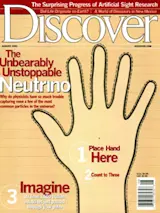Neuroscientist Fred Gage has pulled living cells from the brains of corpses— and the deed may eventually lead to ways to harness the body's recuperative powers to treat degenerative brain disease.
Astrocytes (blue) extracted from the brain of a dead man grow in culture.Courtesy of the Salk Institute
In his lab at the Salk Institute in La Jolla, California, Gage extracted progenitor cells from the brains of 15 people who had been dead more than eight hours. He and his colleagues nurtured the cells in a brew of proteins, antibiotics, and growth factors until the cells multiplied and matured into neurons as well as their support cells, known as astrocytes and oligodendrocytes. Gage argues that cadaver-brain studies allow researchers to avoid the ethical problems of harvesting fetal brain tissue. Cadaver-cell studies have also supported the idea that undeveloped cells are unexpectedly resilient. "One idea is that oxygen breaks down into ...














